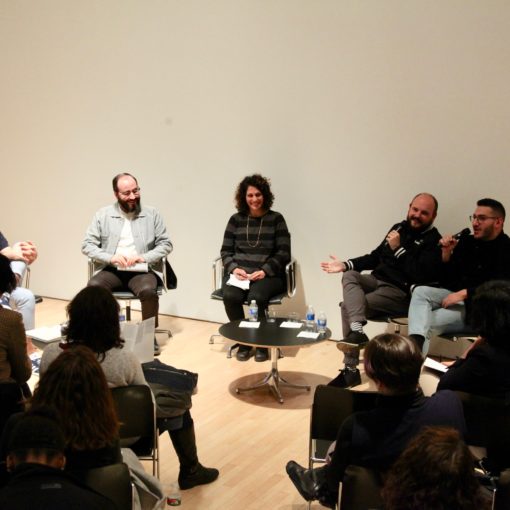This is the third post in a three-part series by PhD students Justin Beauchamp, Queenie Sukhadia, and Maya Godbole about their experiences interning at Ithaka S+R, a higher education research and consulting organization, in summer 2020.
Post 1: “Why I Decided to Do a Summer Internship” by Justin Beauchamp
Post 2: “The Continuities Between the University and Workplaces Outside of It: A Summer Internship at Ithaka S+R” by Queenie Sukhadia

Like many graduate students, I’m all too familiar with feelings of burnout, imposter syndrome, and a lack of work-life balance—feelings that have closely shadowed me throughout my academic career, threatening to disrupt progress and general well-being. Now, in my final year, as I prepare to defend my dissertation and navigate an uncertain job market, I’ve needed to find a way to prioritize my mental well-being. In this endeavor, I was drawn to pursue an experience outside of the academy—namely, a summer internship at Ithaka S+R.
Though this experience provided me with several concrete benefits—from collaboration with passionate co-workers to experience with solving important, real-world problems—I’m most thankful for the shift in perspective that it brought. The experience motivated me to reframe my PhD training as a job, inspiring skills and strategies that I’ve now been able to apply within my daily life to tackle feelings of inadequacy, burnout, and a lack of balance. In this post, I reflect on the strategies that I’ve found helpful to foster sustainable working habits and to change my not-always-healthy relationship with graduate school.
Establishing set work hours
While the flexibility of academia was a blessing at first, it has slowly become my undoing. Too much flexibility can make it difficult to self-start, especially during those inevitable periods when my enthusiasm for research is all but extinct. And, when I allow my schedule to be freely flexible, I often feel creeping anxiety and guilt during times when I am not working, namely evenings and weekends.
Since finishing my internship, I’ve maintained the same working hours, roughly 9 to 6. Though there are some exceptions, I’ve done my best to strictly demarcate the workday—something that is especially important at this moment, as we lack physical separation between our work and living spaces. In doing so, I’ve felt less anxious, and more present, in my free time knowing that I put in my best effort during those hours.
Setting aside time for priority goals
In academia, we have different types of tasks, falling in a 2 x 2 framework, with main dimensions of urgency and importance. I find that the work that most often slips for me are the non-urgent, but important tasks—the ones that cannot be ignored, nor delegated elsewhere, yet often take a backseat to urgent tasks (e.g., teaching). For me, these are almost always tasks related to milestones and academic progress. It therefore takes a concerted effort to add structure and deadlines to realize these goals.
Enter: The Outlook calendar. OK, I did know of the Outlook calendar prior to my internship; however, I’ve often underutilized it in favor of a written planner. Now, I create blocks of “to-dos” that live in my online calendar, which can be dragged and dropped as my schedule evolves. These function not only as a goal-oriented to-do list, but also as a tool to protect time for those non-urgent, important tasks. As a final note: I’ve learned to always block off double the time I think it will take to do something – the planning fallacy is real (as are hourly snack breaks).
Having “better” meetings
I’ve been in several meetings that are seemingly endless, going well past the point of productivity. One of the first forms of “culture shock” during my internship was noticing that meetings had established end times, with few going over an hour, and they concluded promptly at these end times. Having productive, useful meetings is a skill I hadn’t previously considered. It requires you to 1) identify your goals and define a timeline upon which you hope to achieve them, and 2) utilize the meeting time accordingly.
I’ve developed a mental checklist for myself: Is a meeting necessary? If so, what do I hope to get out of this meeting? If a meeting is warranted, I set an agenda and communicate goals and a timeline on the front-end to collaborators. Pro tip: Use a shared calendar invite to set expectations for the length of the meeting and link a brief agenda.
Creating my own reward structures
One of the few benchmarks I have of whether I’m a “good” academic is through my success in grants, journals, or fellowships. Not only are these highly competitive, but they are often based on subjective, and sometimes biased, metrics. As graduate students, we’re also simultaneously plagued by unrealistic narratives (e.g., the prescription that graduate students should always be working) and upward peer comparisons (e.g., focusing on others’ perceived successes or how much they appear to be working), that also feed into our self-evaluations. When these are one’s primary markers for success, and a main source of self-esteem, it’s impossible not to feel inadequate or lingering imposter syndrome.
To combat this, I’ve made a deliberate effort to create different types of reward structures. I set small, scaffolded goals to create my own internal benchmarks: Did I learn a new theory that day? Did I have a positive interaction with a collaborator? Did I sit down and write, even though I ended up deleting everything? Yes? Then, I am a “good” academic.
Separating my identity from my work
Somewhere along the way my “graduate student” identity became inseparable from “core” identity, to the point where my self-esteem in this area permeated to all other aspects of my life.
In my internship, I was able to maintain a clear separation between my work and “who I am”—I realized it’s possible to be passionate and driven toward a goal, without allowing it to feel like an essential part of my being. Since then, I’ve made a resolute effort to shed this all-consuming “graduate student” identity and instead, nurture my hobbies and relationships, and, to let them be an additional source of self-esteem and worth.
Overall, my summer internship at S+R helped me to hone the skills, and mindset, to redefine my graduate school experience and to prioritize my mental well-being. It’s still a work-in-progress, but for this, I am grateful.
 Maya Godbole is a PhD candidate in Basic and Applied Social Psychology. Her research investigates the impact of interpersonal, organizational, and societal factors on women’s and girl’s representation and achievement in male-dominated domains, including leadership, politics, and STEM. She is also involved with a United Nations NGO, whose works aims to contribute psychological perspectives and knowledge to the UN Agenda. Prior to attending the Graduate Center, she received her B.A. in Psychology from the University of Rochester and worked as a researcher at SUNY Downstate Medical Center.
Maya Godbole is a PhD candidate in Basic and Applied Social Psychology. Her research investigates the impact of interpersonal, organizational, and societal factors on women’s and girl’s representation and achievement in male-dominated domains, including leadership, politics, and STEM. She is also involved with a United Nations NGO, whose works aims to contribute psychological perspectives and knowledge to the UN Agenda. Prior to attending the Graduate Center, she received her B.A. in Psychology from the University of Rochester and worked as a researcher at SUNY Downstate Medical Center.







